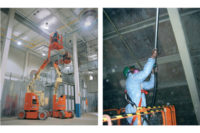 The effects of globalization can be witnessed in so many aspects of our lives, including occupational safety and health (OSH).
The effects of globalization can be witnessed in so many aspects of our lives, including occupational safety and health (OSH).
Firms are facing increasing pressure to remain competitive and, although implementing organizational changes may be necessary, they may result in new risks to workers' well-being. There is concern, however, that health and safety, including the management of psychosocial risks, is being neglected in a race to the bottom. Consequently EU-OSHA has identified “OSH risks related to globalization” as one of its priorities for the next seven years in terms of “emerging risks” in Europe's workplaces, in a recently-released scoping study.
So how do companies react in the face of global competition and how can this impact the well-being of employees? The European Restructuring Monitor estimates that, as a result of globalization, there were 14,000 instances of large-scale organizational change in the decade starting from 2002. Restructuring or organizational change can occur through mergers, acquisitions, closures or relocations, for example. And the effects of these changes are clearly felt by workers, with job insecurity and reorganization quoted as the most common causes of work-related stress across Europe in the 2013 OSH opinion poll.
The changing nature of how we work is also having an impact on our exposure to work-related stress and psychosocial risks. With increased competition comes heightened pressure in the workplace to produce more and more quickly, which in turn can lead to greater work intensity that affects all sectors. Indeed, long hours and excessive workloads come in at second place in the poll as the most common causes of work-related stress.
Added to this is the fact that global companies need to communicate across borders and time zones, and this has been made possible thanks to ever more sophisticated IT services. As a result, employees can find themselves almost “always available,” as Napo demonstrates in his latest clip “Napo in...when stress strikes”- another practice that extends working days and which undoubtedly also increases the likelihood of workplace stress.
So with the pace of change not likely to slow down anytime soon, how can workplaces reduce negative consequences of globalization on their staff, in order to mitigate their exposure to psychosocial risks? Change which is managed well and with sensitivity at organizational level, typified by communicating change to the staff and offering social support, can help smooth the restructuring process and minimize the detrimental effects on workers' health.
And in turn there is support for managers to do just that. The Healthy Workplaces Manage Stress Campaign not only keeps the well-being of workers in the spotlight, it also helps companies to meet their requirements with regard to protecting their workers from stress and psychosocial risks.
Interested in knowing more about globalization and other emerging risks? You can read the full report and visit OSHwiki for further articles. And don't forget, there are also various tools available to help you handle any changes, such as this one from the PSYRES consortium on managing restructuring to maintain employee well-being.
Source: European Agency for Safety and Health at Work (EU-OSHA)






